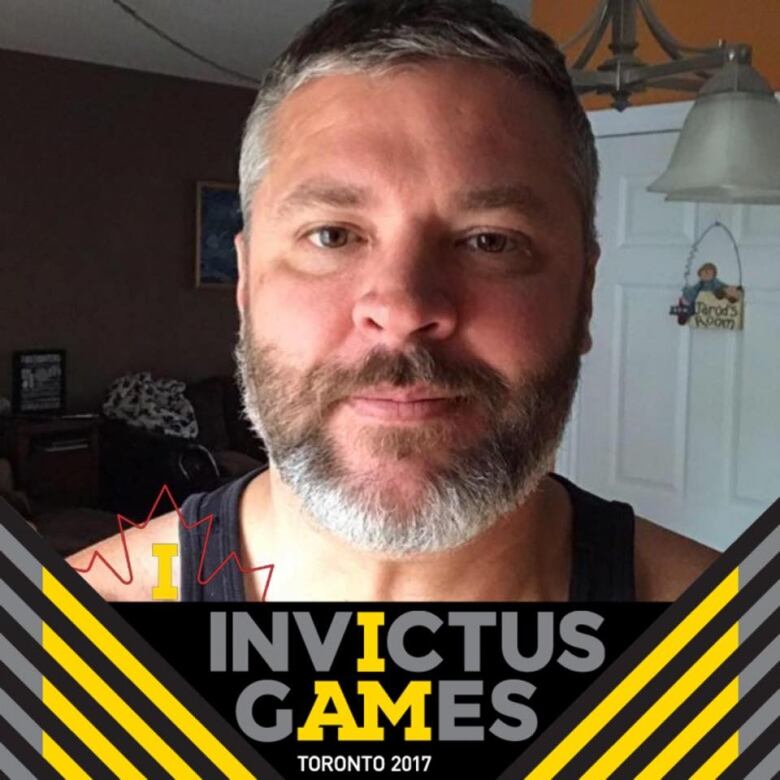Invictus Games offer Ontario veteran with PTSD a 'brighter outlook on the future'
Phil Badanai suffered stroke in April, dedication so inspired teammates he was picked as Canadian flag bearer

Training for the 2017 Invictus Games in Toronto quite possibly saved Phil Badanai's life.
"I have a much brighter look on the future," said the retired Corporal from Thunder Bay, Ont., who is competing in indoor rowing, wheelchair tennis and wheelchair rugby.
"Before, I had kind of written myself off, thinking I was done, which is kind of morbid, " he said, adding "I didn't have any passion. I was miserable."
But the day he learned he'd been selected for Team Canada, he found a purpose and the community he'd been seeking since he left the armed forces.

"Getting back into the military routine, talking with people that get it, they've all been through it, they understand and training for the games, emotionally, physically, it's been great," said the veteran, as he explained that his wounds are more mental than physical.
Although Badanai is able-bodied, under the rules of the Invictus Games, he can compete in wheelchair sports to ensure those teams have enough players to take the field, or the court.
Badanai's primary injury is post-traumatic stress disorder (PTSD), going back to a tour of duty in Croatia in 1994.
He and a fellow soldier, John Tescione, were returning from an observation post when a group of Serbian soldiers opened fire.

Badanai was shot twice in the back; Tescione was shot seven times, four striking his head.
Looking at their bullet-riddled jeep, which sustained 54 shots and is now on display at the Canadian War Museum, still gives Badanai the chills.
"There's a bullet hole in the windshield where my head should have been. I don't know how it missed me, but that image will always be burnt in my head."
'Nobody is this angry'
Those images continued to replay as regular nightmares for Badanai as he relived the incident over, and over again.
Your mind is a wonderful thing if it's working with you, but if it's working against you, it's the most deadly thing in the world.- Phil Badanai, retired Cpl.
But it wasn't until he became a military firefighter, that Badanai started to realize he had a problem.
"It was easier to hide in the infantry because they always like speed and violence, that's what they want, but when you're a firefighter nobody is this angry. Everybody is nice and relaxed, happy and calm, and that wasn't me. I felt off."
Badanai sought help and was diagnosed with PTSD. He received medication and counselling, but it came at the cost of his military career.
Doctors recommended he no longer be deployed to a war-torn country, and a soldier who can not fight, can not be a soldier.
"I joined the military right out of high school. The military raised me. It was everything I knew."
Suffering PTSD he 'fell down some rabbit holes'
Badanai was medically discharged and found a civilian job, but the transition was difficult and he fell "down some rabbit holes I really did not like."
"Your mind is a wonderful thing if it's working with you, but if it's working against you, it's the most deadly thing in the world."
Badanai knew he had to find something to pull him "out of the abyss" and that's when he saw the ad inviting veterans to apply for Team Canada at the Invictus Games.
But less than two weeks after the team's first training camp, he suffered a stroke and spent five days in hospital. However, Badanai had found a purpose and a goal to strive for, and nothing was going to stop him.

'When can I start training?'
"The first thing I said to the doctor when I was being released was 'when can I start training?'"
Badanai made frequent Facebook posts about both his recovery and his training. His dedication inspired his teammates to keep working, and they rewarded his perseverance by choosing him to carry the Canadian flag into the opening ceremonies, an experience he described as "awesome" and "surreal."
Competing at the Invictus Games offers it's own form of healing, said Badanai.
"Whether it's mental or physical injuries, you're not bound by your injuries. It's your recovery that's important."